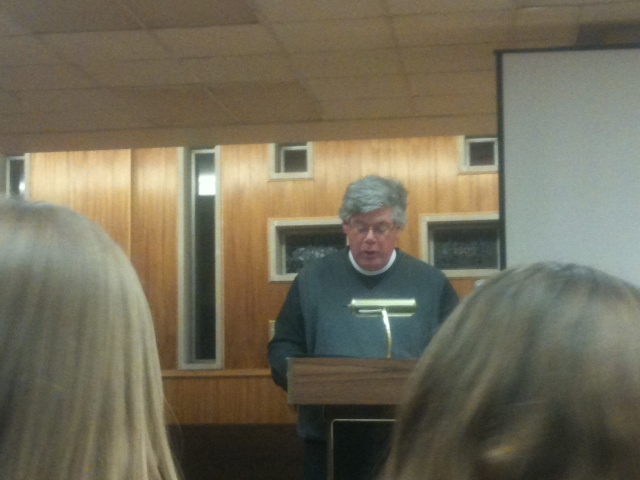A sexuality, marriage and homosexuality debate was held last Wednesday to address the intersection between gay marriage and the church.
The lecture was introduced by Emmanuel Twesigye, Aden S. and Wollam Benedicts professor of Christian studies, who began with the topic of polygamy in African cultures. Twesigye talked about the benefits of polygamy and how it is a symbol of power and wealth as well as “(a) system of community” within the family.
He also talked about homosexuality in Africa, and how the cultures there are against it. He focused on his home country of Uganda, where homosexuality is illegal.
Twesigye said that in the past, “(a) man who got caught in the act would be put to death,” but now, the laws are being modified to punish homosexual acts by long imprisonments.
Twesigye connected both the controversial topics of polygamy and gay marriage. While homosexuality is condemned in most African countries, strong support for gay marriage can be found in the United States.
On the other hand, polygamy in African nations such as Uganda is highly valued, yet shunned here in America.
Twesigye continued by saying, “maybe you should let us have many wives, and we’ll let you have homosexuality.”
The next presenter was Reverend Charles Wilson, the director of St. Peter’s Episcopal Church in Delaware. He said, “next to abortion, the issue of homosexuality is one of the greatest of our time.”
Wilson believes people have developed negative views of homosexuality from religious text. He provided an example of homosexuality in the Bible from Leviticus 18:22, which says, “You should not lie with a male as with a woman.”
Wilson argues the concept of homosexuality as we understand it now was not present when the Bible was written.
He talked about Biblical teachings of sex, and how God encouraged men and women to reproduce. He recited from Genesis, where God says, “Be fruitful, multiply.” Wilson argued this passage portrays sex as natural and as a gift from God in order for humans to reproduce.
One of the main reasons homosexuality was condemned in the church, Wilson believes, is because it discontinues reproduction.
“We agree that heterosexuality is preferred for the reason of procreation,” Wilson said.
He believes that “cultural norms created by the power of the state and religion” have established the idea that sex should be used for the production of children.
Wilson pointed out, “children have always been the main reason for having sex.” He added that historically, children were the ones who would provide for parents when they reached old age.
Because homosexual sex is non-reproductive, Wilson said gays are viewed as “doing something opposite of God.Gays have been demonized,” and the gay community has been “used as a boogeyman” and “monster” to scare children into being “manly.”
He believes that sex is viewed differently today. Wilson used the media as an example. He talked about Beckham’s underwear ads and the Modern Family actress, Sofia Vergara, who has been titled “sexiest woman,” in order to address the way sex is encouraged and used to sell in our culture.
Wilson talked about an “evolution of sex,” which “allows us to view non-reproductive sex in a less negative light.”
He later went on to talk about marriage as an establishment. Wilson said people get married because “we human beings do is organize things.”
In terms of same-sex marriage, Wilson believes gays should have access to the same rights, and “they should allow same sex marriage across the board.” Junior Victoria Wehner was pleased with Wilson’s discussion. “I liked how he mentioned that humans are organizational,” she said. “He brought up some really good points.”
As a member of the LGBTIQ community, freshman Ryan Haddad was happy to see a religious figure in a position of support for gay marriage. “Seeing religious figures that say it’s alright to be who you are is very important,” said Haddad.“(It) gives us comfort and is empowering,” he added. Haddad believes it demonstrates that “not everyone will exclude us.”